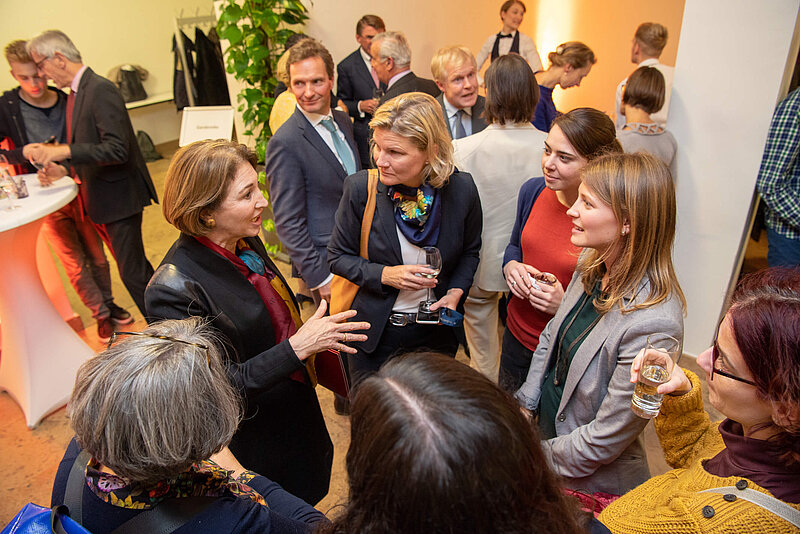
Anne-Marie Slaughter, winner of the 2018 Dr. Michael Endres Prize, answers students' questions on leadership, impact and intersectoral cooperation.
Anne-Marie Slaughter says “caring” is one of the most important qualities for a leader. When the former Director of Policy Planning in the Obama State Department visited the Hertie School on 8 October to receive the school’s Dr. Michael Endres Prize, she showed us a bit of #hertielove. She was also a guest practitioner in the class Managing Non-Profit Organisations and Foundations, in which she shared her experiences as head of a major foundation and offered students insights into her experiences in government, academia and civil society. If you missed her this time, Slaughter will be back several times during the course of the academic year as part of the award. Here are just a few of the valuable insights she shared with Hertie School students.
Does working in a think tank give you the ability to make a greater impact than government work - perhaps because there is more flexibility?
Anne-Marie Slaughter: In government you can have a huge impact, simply because of the scale. One of the things I did while working in government that was most consequential, for example, was the behind-the-scenes work I did toward creating the G20 rather than the G-12, G-15, or some other number. I think this has actually had substantial impact in the world. Another thing was elevating the role of development in the US government. I think that was one of the most important things Hillary Clinton did while she was Secretary of State. We also worked on the Iran deal, but of course that was rolled back with the next administration, so some things do not always work out. Working from the bottom up as in non-profits, it’s harder to have that kind of impact, but in theory we should be able to lift and circulate ideas. This is not always easy, but when government becomes less functional, the bottom-up impact becomes greater.
What makes a successful leader?
Anne-Marie Slaughter: I should say that I didn’t think of myself as a leader until my late 30s. I was teaching at Harvard Law School and I was involved in finding a new president for the American Society of International Law. It was my husband who said to me, “Why don’t you do it? Why can’t you be president?” That was a very important moment for me – deciding to put myself forward and then taking on that position. Of course, I am always terrified when I take on a leadership role – I don’t know anybody who isn’t – and if you’re not scared then you’re stupid! But I have learned so much, especially about myself.
A critical attribute for a leader is caring about and empowering those you lead. Another is to have a set of principles to guide you not only to be effective but also to lead with integrity. You also have to have courage, because people will not like you, some people will be unhappy, and you have to have the courage to say unpopular things. And you have to know what you’re good at and what you’re not good at and how to put together a team and processes to help guide your decisions. For example, I am very good at big visions, at fundraising, at inspiring people. But I am not so good at details and taking the time to run a proper process– I have other people who look after those things and hold me to my word. Nobody has all the skills it takes. Some leaders are better at transforming institutions, others at stewarding them and moving them forward. But all of us have to be prepared to take risks, deal with failures and be resilient.
Do some fields belong more to the public sector and others to the private sector?
Anne-Marie Slaughter: You have to strike a balance between all three sectors – public, private, non-profit. In most areas I can think of, you need all three sectors to solve problems. But how do you keep a healthy balance between all three – how can you make sure they work together? When I was at the Woodrow Wilson School, I told students to go into all three sectors – one of my board members at New America calls these people “tri-sector athletes.” Government has scale and legitimacy, but bureaucracies are frustrating and imperfect. Still, most people would rather have government in charge than non-profits or corporations. But we can learn a lot from the corporate sector and the advantage of civil society is that it can push for good but not be bound by bureaucracy.
---
Anne-Marie Slaughter is currently the President and CEO of New America, a think tank and civic enterprise with offices in Washington and New York. She is also the Bert G. Kerstetter ‘66 University Professor Emerita of Politics and International Affairs at Princeton University. From 2009–2011 sheserved as director of Policy Planning for the United States Department of State, the first woman to hold that position. Prior to her government service, Slaughter was the Dean of Princeton’s Woodrow Wilson School of Public and International Affairs from 2002–2009 and the J. Sinclair Armstrong Professor of International, Foreign, and Comparative Law at Harvard Law School from 1994-2002.
